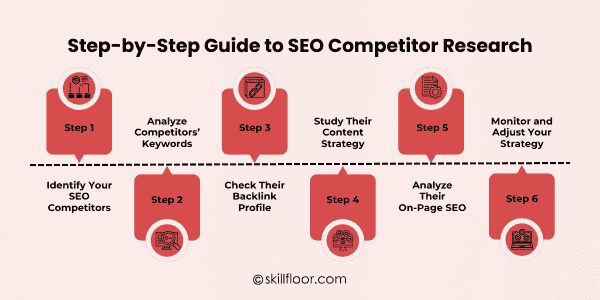How to Do SEO Competitor Research Step by Step with Examples
Learn how to conduct effective SEO competitor research with step-by-step guidance and real examples. Uncover gaps and stay ahead in the competitive SEO game.

Having trouble getting higher on Google? SEO is more than simply keywords; it's also about knowing what makes your rivals successful. Finding possibilities, improving your approach, and producing better content are all possible by examining their ranks, backlinks, and content. The goal is to study, get better, and remain ahead of the competition in search results, not to duplicate!
Not only do successful businesses provide content, but they also research competitors. Businesses may find ranking keywords, high-performing content, and backlink tactics by doing SEO Competitor Research. Making data-driven judgments is essential to remain ahead in digital marketing. With more intelligent SEO tactics, you can improve your plan, raise your ranks, and draw in more clients by learning from your rivals!
Driving without a map is analogous to mindlessly enhancing your website without conducting SEO competitor research. Analyzing actual evidence rather than only conjecture aids in decision-making. Tracking keywords, backlinks, and high-quality content allows you to improve your approach, cut down on pointless work, and concentrate on the things that raise your ranks.
What is SEO?
Enhancing a website's exposure on Google and other search engines is known as SEO (Search Engine Optimization). It increases the ranking of brands, blogs, and companies for pertinent searches, which attracts more customers. An audience that is well-suited to the site is drawn in, and it naturally increases online growth.
In SEO, backlinks, content, and technical elements like mobile friendliness and page speed are all optimized. With the correct tactics, websites may rank on the top page of search results, boosting their visibility and reputation. Regardless of the size of your company, SEO is crucial for sustained success in the digital sphere.
The Importance of SEO in Digital Marketing
-
Increases Website Visibility: Customers will find you more easily when they search for related goods or services due to SEO, which improves your website's visibility on search engines.
-
Drives Organic Traffic: Without the use of paid advertisements, a well-optimized website draws in organic traffic. Increased traffic implies more chances to turn consumers into devoted clients and expand your company.
-
Builds Credibility and Trust: A better Google ranking indicates authority. Users are more inclined to trust your brand and its content when they see your website on the top page.
-
Improves User Experience: SEO improves a website's mobile friendliness, speed, and navigation in addition to keywords. A well-optimized website lowers bounce rates and maintains user engagement.
-
Boosts Long-Term Growth: SEO activities continue to provide benefits over time, helping businesses expand sustainably with consistent internet presence, in contrast to paid advertising that ceases when the funding runs out.
-
Helps Beat Competitors: If your competitors are ranking higher, they’re getting more clicks. Investing in SEO ensures your business stays ahead and captures the audience searching for your services.
What is SEO Competitor Research?
Understanding competitors' ranking tactics by examining their websites is known as SEO competitor research. Finding their best-performing keywords, backlink sources, and content strategies is aided by it. Businesses may improve their SEO strategies to rank better in search results by researching what works for them.
SEO Competitor Research gives you facts so you may make well-informed judgments rather than speculating about what could work. It highlights areas that require development as well as gaps and possibilities. Businesses may improve their website, increase traffic, and maintain their competitive edge in the digital market by utilizing this information.
Why is SEO Competitor Research Important for Your Website’s Growth?
-
Identifies Winning Strategies: By examining competitors, you may determine what works, including content and keywords. You may successfully improve your SEO strategy and save time by taking note of their achievements.
-
Find Keyword Opportunities: By identifying the high-ranking keywords that your competition employs, you may target better or comparable ones, improving your chances of ranking higher and drawing in organic visitors.
-
Improves Content Quality: You can produce more value, interesting, and educational content that increases user engagement and keeps visitors on your site longer by researching top-performing content.
-
Enhances Backlink Strategy: Research on SEO competitors helps in locating reliable backlink sources. Your domain authority is increased and your search engine rankings are raised when you obtain backlinks from reliable websites.
-
Helps Stay Competitive: Businesses must adjust to the ever-evolving SEO market. Knowing your competition helps you remain ahead, regardless of your level of experience or level of enrollment in digital marketing courses.
-
Boosts Website Growth: Better rankings, more traffic, and long-term growth are the results of a solid SEO strategy built on competitive data, which also helps your website become more visible and authoritative online.
Key Benefits of SEO Competitor Research
-
Saves Time and Effort: Analyzing competitors provides you with a clear path rather than relying on trial and error. You may save time and money by concentrating on tried-and-true SEO tactics.
-
Uncovers Content Gaps: Research on your competitors enables you to find subjects they haven't addressed or places in which you can offer more thorough, superior content to draw in and keep readers interested.
-
Optimizes Local SEO: You may enhance your Google My Business page, get more local backlinks, and optimize for location-based searches to draw in local customers by researching your competition.
-
Improves Technical SEO: Analyzing how other websites are organized, speed-optimized, and mobile-friendly provides information about how to improve the technical SEO of your website for improved performance.
-
Enhances Social Media SEO: Analyzing your competitors enables you to learn how they communicate with you on social media, which platforms generate the most traffic, and how to adjust your approach accordingly.
-
Boosts Conversion Rates: By studying the effective landing pages, calls to action, and user experience tactics of competitors, you can improve your own strategy and raise site engagement and conversions.
Step-by-Step Guide to SEO Competitor Research
1. Identify Your SEO Competitors
How to find them:
-
Google Your Target Keywords: Look up the websites that rank on the top page by searching for your primary keywords. These are the people who are directly competing for the same audience.
-
Use SEO Tools: Platforms such as Ahrefs, SEMrush, and Ubersuggest show websites that rank for related keywords, which makes it easier to find competitors and effectively evaluate their SEO tactics.
-
Look at Industry Leaders: Despite the dominance of large companies in your area, researching their tactics might help you come up with improved SEO and content ideas for your own audience.
Example: Men's Health, Bodybuilding.com, and Nerd Fitness are possible competitors for fitness blogs since they score well for fitness-related searches and draw similar readers.
2. Analyze Competitors’ Keywords
How to find their keywords:
-
Use Ahrefs or SEMrush: These tools display which keywords are most popular with competitors. Targeting comparable or superior keywords is made easier by determining which are their top performers.
-
Look for High-Volume, Low-Competition Keywords: Keywords with high search demand but little competition should be given priority. With little work, this tactic boosts organic traffic and ranking prospects.
-
Pay Attention to Long-Tail Keywords: Ranking for keywords with three or more words is simpler. They increase user engagement and draw in highly targeted visitors to your website.
Example: Creating excellent, well-optimized information on the same topic as your competition will help you rank higher and draw in more visitors if they rank for "best home workouts for beginners."
3. Check Their Backlink Profile
How to analyze backlinks:
-
Use Ahrefs or Moz Link Explorer: These tools assist in analyzing backlinks from competitors and display the websites that connect to them. Gaining insight into their backlink sources enhances your approach and reinforces your SEO competitor research.
-
Look for High-Authority Domains: Pay attention to backlinks from reliable websites, such as news outlets, trade blogs, and learning resources. These high-quality connections raise your website's rating and increase your trustworthiness.
-
Reach Out with Valuable Content: Contact websites that provide relevant, high-quality material and connect to rivals. Thorough SEO competitor research guarantees that you offer insightful information, improving your chances of obtaining backlinks.
Example: Use SEO Competitor Research to find comparable chances and submit a guest post to obtain high-quality backlinks if a fitness blog receives backlinks from a reputable health publication.

4. Study Their Content Strategy
How to analyze content:
-
Check Engagement on Blog Posts, Videos, and Guides: Analyze whose content from competitors receives the most backlinks, shares, and comments. You may provide more interesting and pertinent content for better outcomes by knowing your audience's preferences.
-
Look at Content Length, Format, and Tone: Analyze how competitors organize their content. Understanding their technique helps you improve your own content optimization plan for higher results, regardless of how extensive and thorough it is or how brief and to the point it is.
-
Identify Infographics, Videos, and Interactive Elements: Engagement is increased by interactive elements and visuals. If rivals successfully employ them, think about including comparable components into your writing to enhance readability, user experience, and search engine rankings.
Example: If the "10-Minute Yoga Routine" blog of your competitor has a high search engine ranking, make a more thorough version with improved graphics, step-by-step directions, and interesting videos to draw in more visitors.
5. Analyze Their On-Page SEO
Key elements to check:
-
Title Tags & Meta Descriptions: Verify whether opponents' title tags and meta descriptions contain the targeted keywords you want to employ. Improved search visibility and higher click-through rates are two benefits of properly designed meta descriptions.
-
URL Structure: Short URLs with plenty of keywords score higher and are simpler for people to remember. You can improve your URL's user experience and SEO effectiveness by analyzing that of your competitors.
-
Header Tags (H1, H2, H3): Both SEO and readability are enhanced by structured headers. Use a similar strategy to improve the content structure of your website if your rivals successfully use appropriate headers to categorize their information.
Example: If the meta description of a competitor reads, "Discover the best home workouts for weight loss in just 30 days!" consider creating a more interesting version that draws attention to the advantages and entices readers to click.
6. Monitor and Adjust Your Strategy
-
Track Competitor Rankings Regularly: Rankings are subject to regular changes, and SEO is dynamic. To see changes in keywords, backlinks, and content engagement, track competition performance using tools like Ahrefs or SEMrush.
-
Analyze Traffic and Engagement Trends: Observe how other websites draw in and hold on to visitors. Your strategy may be improved for more audience engagement by being aware of their user behaviors and traffic sources.
-
Refine Content and SEO Strategies: Make the necessary adjustments to your plan if your rivals update their content or use new SEO strategies. Frequent optimization guarantees that your website maintains its competitiveness and high search engine ranking.
Best SEO Competitor Research Tools to Use
|
Tool Name |
Key Features |
Best For |
|
Ahrefs |
Backlink analysis, keyword research, competitor insights |
Comprehensive competitor research & backlink tracking |
|
SEMrush |
Keyword tracking, site audits, competitor analysis |
Advanced SEO, PPC, and traffic analysis |
|
Moz Pro |
Domain authority check, keyword research, site audits |
Improving domain authority & tracking rankings |
|
Keyword suggestions, backlink insights, competitor data |
Budget-friendly SEO research for beginners |
|
|
Google Search Console |
Keyword rankings, indexing issues, performance tracking |
Monitoring website health & traffic analytics |
|
SpyFu |
Competitor PPC campaigns, keyword analysis, backlink tracking |
Google Ads & SEO competitive research |
Common SEO Competitor Research Mistakes to Avoid
-
Focusing on the Wrong Competitors: Not every site with a high rating is a competitor. Instead, then looking at big, unrelated brands, look at companies in your sector that cater to a comparable demographic.
-
Ignoring Keyword Intent: Finding rival keywords alone is insufficient. You can provide content that better meets users' requirements and increases engagement by knowing why they search for such phrases.
-
Overlooking Backlink Quality: Obtaining backlinks from any website won't be helpful. Prioritize reputable, pertinent websites above inferior ones that might lower your SEO ranks.
-
Neglecting Content Quality: It won't be enough to just imitate rival subjects. To stand out and get more visitors, your material should be more informational, interesting, and valuable.
-
Not Tracking SEO Changes: The field of SEO is continually changing. Your website may become out of date and struggle to retain ranks if you don't keep an eye on competition upgrades and algorithm adjustments.
-
Relying Too Much on Tools: Although SEO tools offer valuable insights, manual analysis is just as crucial. For a more effective competition research plan, always mix data with real-world observations.
SEO success involves more than simply improving your website; it includes knowing what strategies are most effective in your sector. Businesses may find new possibilities, improve their strategy, and remain ahead of the competition by utilizing SEO Competitor Research. Gaining high-authority backlinks, improving content, and identifying winning keywords are all made easier by analyzing rankings, backlinks, and content. Your plan will be grounded on factual information, not conjecture if you employ a robust SEO Competitor Research technique. You may quickly adjust to changing market conditions by conducting regular SEO Competitor Research. Your website may develop over time, draw in more users, and improve its search engine results with the help of excellent SEO Competitor Research.




























































